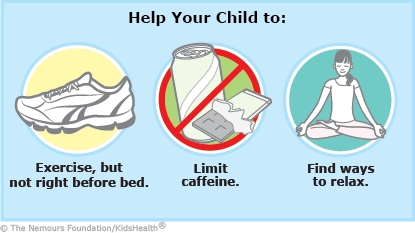Restless Legs Syndrome: How to Care for Your Child
Someone with restless legs syndrome (RLS) has a strong urge to move the legs and an uncomfortable feeling in the legs (such as tingling, itching, crawling, or burning). Moving the legs brings some relief. Symptoms are usually worse in the evening and at night, so it can be hard to fall asleep or stay asleep.
Making changes in everyday activities can sometimes help with restless legs syndrome. Low iron in the blood (iron-deficiency anemia) may play a role in RLS, so if your child's iron is low, the health care provider will prescribe iron supplements.


Follow your health care provider's advice for:
To help when your child has symptoms, they can try:
-
Massaging or stretching the legs.
-
Putting a cool compress or heating pad on the legs (whichever is more soothing).
-
Putting a vibration device on the legs.
Not getting enough sleep can make symptoms worse. Kids who are 5–10 years old need about 10–11 hours a night and older kids and teens need about 9 hours a night. To get the sleep they need, help your child:
-
Avoid or limit caffeine (found in coffee, tea, soda, and chocolate), especially in the afternoon and evening.
-
Get plenty of exercise (but not too close to their bedtime).
-
Have a relaxing bedtime routine.
-
Keep electronics and phones out of the bedroom.
To lessen symptoms, encourage your child to:
-
Avoid smoking cigarettes, vaping, and anything else that puts nicotine into the body (such as oral nicotine pouches and lozenges). For help quitting smoking or vaping, go to smokefree.gov, text QUIT to 47848, or call 800-QUIT-NOW.
-
Avoid alcohol.
-
Only take medicines as prescribed by a health care provider. Some medicines (even ones you can buy without a prescription) can make symptoms worse.
-
Manage stress and relax. They may want to hang out with friends, play a game with family, talk to a counselor, or try meditation or yoga. They can also look at how screen time/social media and doing too many activities might increase their stress.

Your child:
-
is very sleepy during the day
-
has a hard time in school
-
seems depressed, anxious, or moody
-
has jerking movements of the arms and legs during sleep

What causes restless legs syndrome? The cause isn't clear. It may be related to low iron in the body and/or brain chemicals. It can run in families.
How does restless legs syndrome affect someone? The bothersome leg symptoms can make it hard to get enough sleep. Kids who don't get enough sleep may be cranky, stressed, have trouble concentrating, and act out.